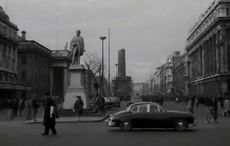Interested in reconnecting with old friends and relations you may not have seen in years? Just write about them and then have it published somewhere. You’ll hear from them before the ink dries. Believe me, nothing catches an Irish persons attention like the written word.
It won't actually matter if the words you write are complimentary or insulting, in fact it'll be beside the point. Irish people live in mortal dread of scrutiny. Call it a colonial consequence. The spud that rises gets the spade.
We know this in our DNA. It's why we're so leery of Irish writers. Successions of invading hordes have brought trouble to our shores, but no one makes our knees knock like a homegrown bard.
I discovered this fact for the first time whilst witnessing the outsized reaction to Frank Mc Court's masterful Angela's Ashes in the 1990's. At the time I had no idea who he was. I was just another blow-in in a bookshop in Connecticut in 1997 when that famous picture on the cover caught my eye.
Well there's a member of the tribe, I thought, looking at the barefoot street urchin on the dust jacket. Just look at the big head on him. I picked it up and read the opening paragraph. It felt a bit like discovering The Catcher In The Rye at 14. McCourt's mordantly funny memoir had me immobilized with laughter and recognition in about a minute. It really cast a spell, that book. I took it home and read it in one sitting.
Because McCourt’s narrative voice was so strong you could sometimes forget what all of it had cost him; all that poverty, hunger, desperation and abuse in Limerick. A minute after each tragedy he described he'd have you laughing again with the absurdity of it. It’s such an Irish reflex that, to contend with insurmountable despair by laughing.
Later, I lost count of the number of subway riders I noticed reading Angela’s Ashes on their way to and from work. It seemed the whole of Manhattan had bought a copy. Quite a few of them appeared to be immigrants too, which might have pleased him.
Unfortunately it wasn't McCourt’s achievement (that book will endure for centuries) that was remarked on by of some of his less forgiving Irish readers. It was what he had dared to say about Limerick and his poor Ma that caught their eye.
Locals declared he was a “con man” and a “hoaxer” who had “prostituted” his own mother for fame. How they claimed to know this better than he did always surprised me.
Limerick broadcaster Gerry Hannan waged a personal campaign against the book after it appeared. “'He knew the right things to say to get the result he wanted,” Hannan lamented in The Daily Mail. “He’s a darling on television. He’s got this beautiful brogue and he can put the charm on. And don’t get me wrong, the book is beautifully written. But it’s not true.”
Things got even weirder then. A former schoolmate confronted McCourt at a book signing and ripped a copy of Angela’s Ashes in half. Threats against him forced Limerick University to step up their security when he visited the college. People who had accused McCourt of losing the run of himself in the book were losing the run of themselves in reality.
They were missing the point too. It was McCourt’s story; it was up to him to tell it in any way he saw fit. If they didn’t like what he had to say or if they disagreed with it, well let them write their own book. He often told them as much.
With hindsight now a lot of the grousing when the book appeared can be seen for what it was: stung irritation that anyone had dared to rake over those old coals at all. It was McCourt who had held the mirror up, it could have been anyone; but not anyone could have done it so well.
In legend, they say a Cygnus swan sings a beautiful song before it dies. McCourt did it in reality. McCourt began Angela’s Ashes in his retirement, after spending three decades as an inspirational teacher in the city’s classrooms. He changed young peoples lives for the better. He worked hard to do it. How many of us can say the same? It’s miraculous, in a way, that we have his book at all.
In Ireland stories are often things that we think happen to other people. We’re too modest or too meek to contemplate them happening to us. McCourt showed Limerick and Ireland and the world that we really were as good a subject as any. That was his challenge, but it was also his gift.




Comments